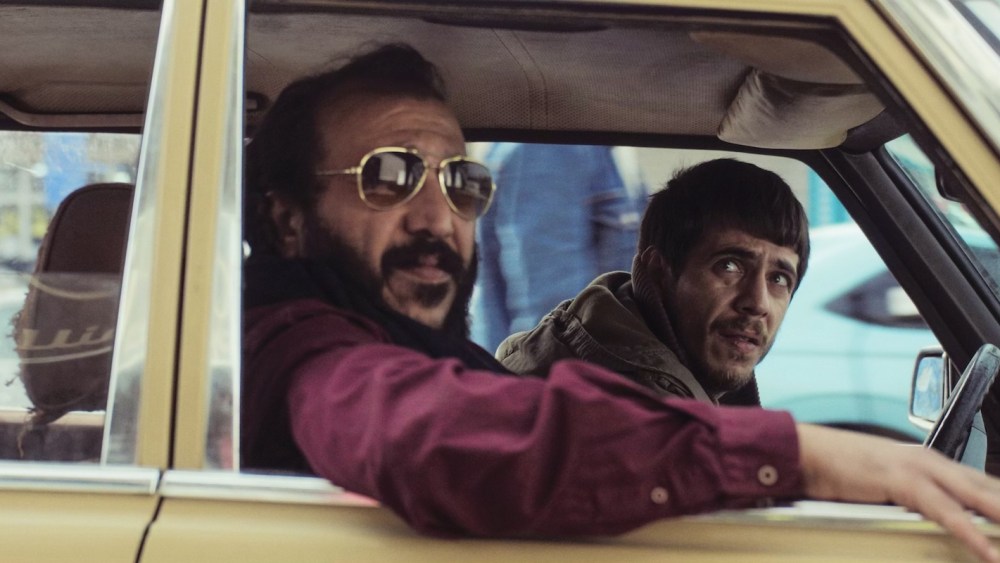A Scattered Palestinian Crime Farce
Directed by the twin duo of Tarzan and Arab Nasser, “Once Upon a Time in Gaza” is about a collaboration of a different sort: a small-time drug scheme concocted by timid university student Yahya (Nader Abd Alhay) and burly restaurant owner Osama (Majd Eid). Although set in 2007, the well-meaning, tongue-in-cheek drama has a penchant for connecting its setting to the contemporary political zeitgeist, which it vocalizes loudly and overtly. However, its self-reflexive, bifurcated story — about using cinematic images to create a revolution — ends up ironically flaccid.
Captured with careful compositional intent, the movie’s first half sees Osama, the brains of the operation, sending Yahya to acquire pain meds using forged prescriptions, which they plan to sell by hiding them in pita sandwiches from Osama’s hole-in-the-wall falafel joint. As this plot unfolds, it’s buoyed by the light and humorous tension of the duo’s disagreements — which the Nassers allow to play out to the point of absurdity — and by the corrupt police officer on their tails, Abou Sami (Ramzi Maqdisi). All the while, newspaper headlines and stories on TV tell of growing tensions, as Israel has recently declared Gaza “hostile territory” and plans to literally wall them off.
The looming presence of this political specter is seldom tethered to the ongoing rigamarole, except in the minor instance of Yahya being prevented, by the Israeli authority, from traveling to the West Bank to see his mother. On one hand, it’s impossible to tell a story about modern Gaza without the shifting parameters of its existence coming up in some way. On the other, this seldom has an impact on the movie’s larger goings-on. The moral dilemma faced by Osama, as Abou Sami offers him freedom in exchange for a cut, feels suddenly interrupted by each injection of the wider world, instead of the two being interwoven.
Granted, there’s a minor farcical streak that offers the film a bit of an escape hatch. It begins with recent audio clips from U.S. President Donald Trump claiming to want to turn Gaza into a private riviera, alongside recent clips of Gaza’s buildings being razed to the ground. This, in effect, frames even the movie’s unrelated, apolitical happenings as being at the mercy of this dangerous future, backed by Western powers. However, none of the news items ever truly feels like a premonition, given their swift and uninvolving appearance, verging on ironic in intent.
There’s also a greater farce at play, though it takes a while to arrive. The movie’s opening images are of a low-budget production filmed in-world, called “The Rebel,” billed as the first action movie shot in Gaza. It plays like a joke at first, but comes back around in the movie’s second half, which pivots almost entirely to the actual making of this movie — about a heroic armed resistance — in which Yahya finds himself involved through sheer coincidence.
This seeming act of fate recenters the movie’s Hollywood-inspired title and images. Up to this point, a number of scenes feel inspired by major Hollywood influences, from “Pulp Fiction”-esque banter to music that echoes Nino Rota’s score for “The Godfather” to a surreal close-up that mirrors the opening of “Apocalypse Now.” These aren’t references for the sake of reference, but rather, a seeming attempt to reckon with the dueling influence of American culture and American politics, with the former helping Gaza’s filmmakers to build their images and identities, and the latter funding weaponry used to destroy them.
The movie seems to shift in focus, toward the creation of revolutionaries as a cinematic idea, but it soon discards all these meta-textual flourishes in favor of a final act built around even more acts of destiny, which ends up going awry. Using coincidence to get a story going is one thing, but unless nihilism is the point and purpose — à la Coen brothers’ “A Serious Man” — using coincidence to end a story as well can be incredibly unsatisfying. This, coupled with the movie’s refusal to fully dive into its characters’ desires for vengeance (when things become especially violent), renders “Once Upon a Time in Gaza” more facsimile than homage or self-reflection, and more distant observation than rigorous, tongue-in-cheek inquiry into life under occupation.


